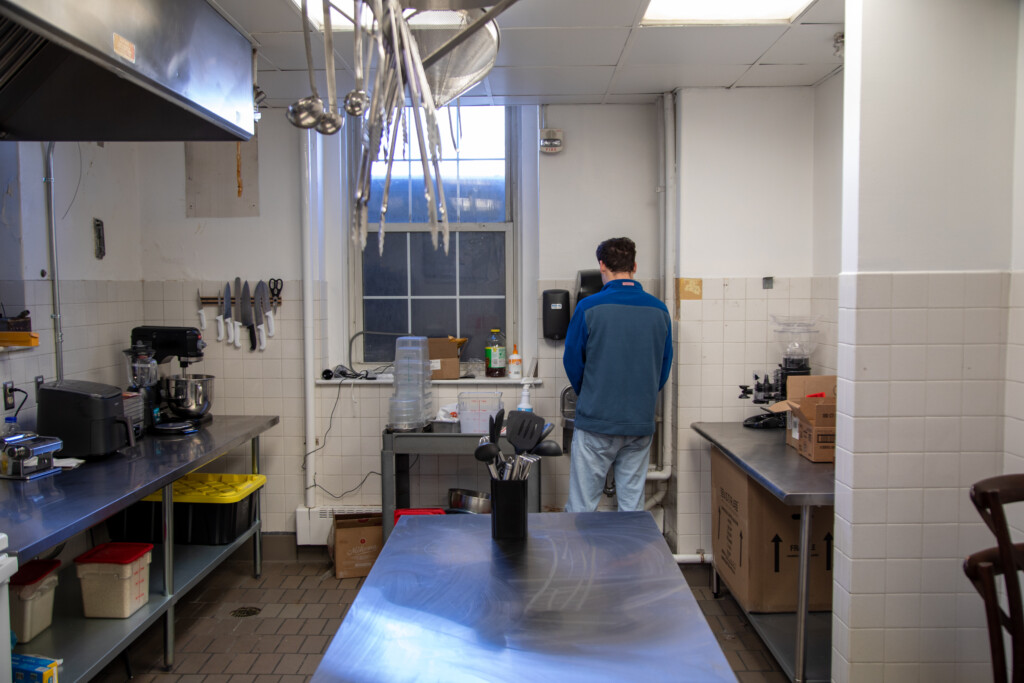The following address was delivered at the “Sanctuary Over Suppression” demonstration on River Campus March 20. It has been edited for clarity.
I am here today to demonstrate that I will not be surrendering my first amendment rights without a fight. I am here today too, to say that, as faculty, we are here to support you. We support you in loco parentis, and we support you as people whose survival is inextricably bound to your survival. To whatever extent you need us, please call on us.
Nov. 15, 2023, an ad hoc group of us wrote to senior University administrators:
We write to you privately as a group of Jewish-identified faculty with relevant expertise to state as follows: The coordinated attempt to smear pro-Palestinian and anti-war speech on campus as antisemitic hate speech is anti-Arab, Islamophobic, and antidemocratic. The end goal of this smear campaign is to delegitimize criticism of Israel’s brutal assault on Gaza – criticism that is apt, necessary, and urgent. The proximate goal of this campaign is to bully our students who are publicly allied with the Palestinian freedom struggle, many of whom are students of color and international students […] The University must maintain a strong position on free speech to protect our students from an antidemocratic campaign that seeks to expose them to possible doxxing, violence, arrest, and deportation.
Nov. 15, 2023. What is happening now was already foreseeable then. The recent abductions of Mahmoud Khalil and Badar Khan Suri represent the Trump-era escalation of a coordinated campaign launched in the Biden era and actively nurtured by elites across the political spectrum. What has been credulously framed as a response to alleged antisemitism on campus is better understood as an authoritarian campaign that weaponizes the charge of antisemitism to silence, punish, and now eliminate political dissent. Pursuant to this push, under sustained attack on our campus have been student leaders, student journalists, and faculty members. As is a secret to no one, some of those most viciously targeted are Jewish.
The Trump-era escalations that presently place non-citizen advocates for Palestinian survival in the crosshairs are very scary. Whereas, as per the Biden-era standard articulated prominently in the Oct. 26, 2023 Anti-Defamation League and Brandeis Center Letter to Presidents of Colleges and Universities, which targeted pro-Palestine student groups, the benchmark for potential criminalization and deportation was “providing material support to Hamas,” the emergent standard, as articulated by Department of Homeland Security spokespeople, is participation in “activities aligned to Hamas.” This shift, which seemingly signals a leap beyond the bounds of law, represents an obscene net-widening. Right now, attention must be focused on protecting the non-citizens among us. Surely, however, I am far from the only one here today who has been accused of being pro-Hamas.
My remaining remarks are directed to senior University administrators. For 18 months, UR’s administration has seemingly pursued a strategy of trying to keep its head down to minimize potential blowback. I have no doubt that President Mangelsdorf and her team have been working assiduously to try to minimize harm to members of our campus community. However, under acute pressures, civil liberties have been curtailed; police violence has been authorized; and students have been harassed, jailed, suspended, and expelled. The emergent wave of persecution against non-citizens needn’t be placed on a “slippery slope” to be a horror, and the University must do everything in its power to shield and support these vulnerable members of our community. Only in mulish denial, however, could one believe with confidence that the persecution will stop with non-citizens. That which in the Biden era was a discrete political tactic is, under Trump, but one component of a broadside assault against higher education in sum. A strategy of continuing to hide and appease may well postpone what’s coming, but I don’t believe it can stop it. If avoidance remains the strategy, the question isn’t if our time will come but rather when.
My hope is that UR’s administration is coming to this same conclusion. My hope is that its authorization of today’s demonstration is a signal of this dawning awareness. These are unprecedented times and far be it from me to pretend as if how to proceed is at all obvious. However, in an interview aired yesterday with Chris Hedges, ousted Columbia Law professor Katherine Franke pointed compellingly to how institutions might resist authoritarian tactics: “There are plenty of examples of how this playbook plays out,” Franke said. “And typically, what slows it down or stops it is institutional actors putting their foot down. Not capitulating and negotiating but saying ‘No more. We will not collaborate in this.’”
We know UR is capable of this kind of courageous oppositional leadership because we saw it in its recent lawsuit filed with peers against the Trump administration for its cuts to National Institutes of Health research funding. Comparable collective action against the erosion of civil liberties is painfully overdue. I do not believe such a suggestion is pie-in-the-sky. Responding to the Trump administration’s bullying of Columbia, university presidents are beginning to poke their heads out of their isolated foxholes. Michael Roth at Wesleyan has been outspoken for some time. Yesterday, in the pages of the Atlantic, Princeton’s President Chris Eisgruber issued a call to arms. Eisgruber wrote: “The attack on Columbia is a radical threat to scholarly excellence and to America’s leadership in research. Universities and their leaders should speak up and litigate forcefully to protect their rights.”
Divided, higher education in the United States could well fall. But if college and university leaders have the wisdom and courage to band together, in broad, principled defense of civil liberties and academic freedom, we may stand a fighting chance. Our institutional mission is the bedrock of American democracy. Safeguard the former and maybe we can salvage the latter.

